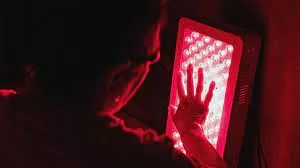A recent study suggests that red light therapy could be a promising avenue for managing blood sugar levels in individuals with type 2 diabetes, shedding light on a potential non-invasive treatment option for the condition.
Type 2 diabetes, which affects between 90% to 95% of individuals with diabetes, is known to be manageable and potentially reversible through medications and lifestyle changes. Now, researchers are exploring the potential benefits of red light therapy in this context.
The study, published in the Journal of Biophotonics, focused on 30 healthy participants with no known metabolic conditions. Half of the group received a 15-minute session of red light therapy, while the other half did not. Following this, all participants consumed a sugar drink, and their blood sugar levels were monitored over the subsequent two hours.
Results from the study indicated that participants who received red light therapy experienced reductions in their peak blood sugar levels and overall blood sugar levels compared to those who did not undergo the therapy. These findings suggest that red light therapy could have a beneficial impact on blood sugar management.
Dr. Michael Powner, co-lead author of the study and senior lecturer in neurobiology at City University London, explained that red light therapy works by positively impacting the mitochondria within the body’s cells. This process helps to increase energy production, thereby requiring more glucose from the blood, which can contribute to lowered blood sugar levels.
While the study was conducted on individuals without diabetes, researchers believe that these findings hold promise for individuals with type 2 diabetes. Red light therapy, which utilizes low-wavelength red light or near-infrared light, has shown potential benefits in various areas of health, including skin treatments and reducing certain cancer treatment side effects.
However, experts caution that further research is needed to fully understand the impact of red light therapy on individuals with abnormal glucose metabolism and to determine optimal exposure levels. Dr. Jennifer Cheng, an endocrinologist at Hackensack Meridian Jersey Shore University Medical Center, emphasized the importance of continued research efforts in finding new ways to manage blood sugar levels and mitigate the effects of diabetes.
As researchers delve deeper into the potential benefits of red light therapy, it offers a ray of hope for individuals living with type 2 diabetes, providing a non-invasive and potentially effective avenue for blood sugar management.












